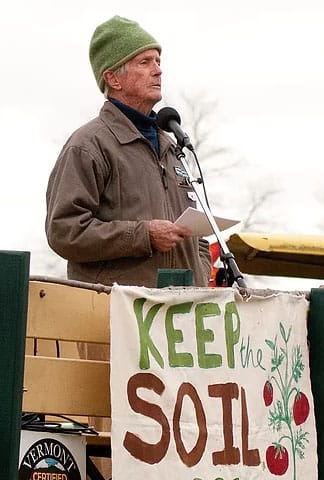Cornucopia’s Take: Pioneering organic farmer Eliot Coleman of Four Season Farm in Maine has shared his knowledge of the soil and growing food with growers from around the world. He has also been a vocal critic of the USDA National Organic Program. Read his latest commentary on the NOP and organic below.
DEFENDING THE MEANING OF “ORGANIC”
by Eliot Coleman
 |
Rally in the Valley Source: Real Organic Project |
Organic farming began as a statement of faith in the nutritional superiority of food grown on biologically active, fertile soils. The early organic farmers knew that quality food can only result from the quality soil care practiced by the good farmer. Unfortunately, that idealistic stance is no longer the reality for much of the food sold as organic in the US today.
I am one of a group of old-time organic farmers who have been battling against the US Department of Agriculture for allowing hydroponic produce to be sold as certified “organic”. The enabling legislation of the US Organic Standards passed by Congress states clearly that maintaining and improving the fertility of the soil is a requirement for organic certification. Traditional organic farmers understood that crops grown in water or some inert medium utilizing liquid fertilizers could not be the same as soil grown crops. Hydroponic food can no more duplicate the nutritional quality of soil-grown food than Nestle’s artificial baby formula can duplicate that of human breast milk.
Legal standards are needed to maintain quality. The 50-year-old woven cloth in my favorite Harris tweed jacket is a good example of a traditional quality product that has been protected by legal definition. Organic has also been protected by legal definition, but our problem today is that the law is not being enforced in the US. The pressure on the US Department of Agriculture by the hydroponic industry has undermined the organic label. Allowing hydroponics to be certified as organic is fraud, pure and simple. But there is a serious side effect of that fraud that needs to be pointed out. Allowing the word organic to be associated with hydroponics conveys a totally misleading understanding of what organic actually means.
Organic is not simply a marketing term. It defines a system of agriculture that acknowledges the pre-eminence of soil life. The extensive recent research into the activities of the stunningly complex micro-biome of the soil reinforces the validity of organic thinking. It has always been acknowledged that human survival rests upon the mere inches of soil which lie upon the surface of the planet. Only one agricultural science – traditional organic farming – has shown the ability to maintain and enhance the quality of those inches. On a planet with diminishing resources, real organic farming is the only honestly sustainable solution to feeding its people. In contrast, hydroponic growing is unsustainable due to its dependence on inputs and its enormous consumption of energy. Hydroponic is the antithesis of organic.
Real organic farming does not need inputs because it can endlessly renew soil fertility with crop rotations, green manures, cover crops, farm-derived compost, grazing livestock, deep rooted legumes and other time-honored practices that nurture the boundless energy and logic of the earth. Real organic farming is cyclical and can succeed wherever there is soil. Its environmentally-sound production systems are based on management inputs, not product inputs. Thus, they are freely available to everyone everywhere. Real organic farming can provide mankind with food in perpetuity. The same cannot be said for the technologically-fragile, energy-intensive, input-based, factory-food systems that have falsely claimed the organic label.
It is not just the illegal use of the name organic that should guide a decision against organic hydroponics. The greater concern must be to preserve our understanding of the living-soil agriculture defined by organic so there is no confusion about the farming techniques that will successfully feed future generations.

